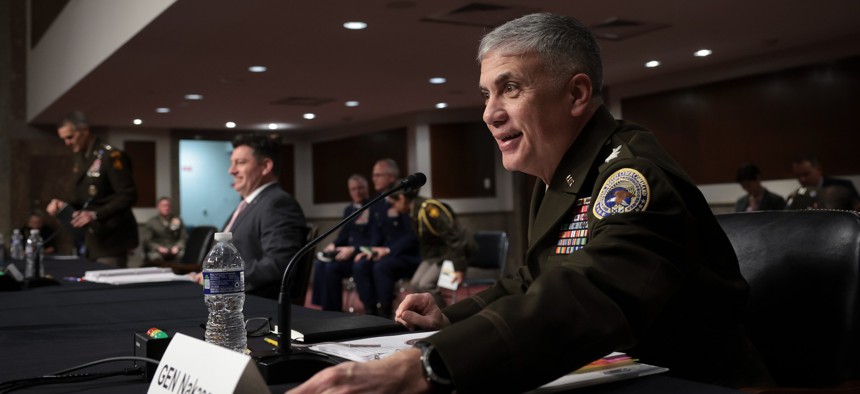
Gen. Paul Nakasone, Cyber Command head and Director of the National Security Agency , prepares to testify at a Senate hearing, April 5, 2022 Win McNamee/Getty Images
Solarium Co-chairs Urge the White House to Maintain Trump-era Cyber Authorities
Lawmakers expressed concern that rolling back the authorities from a 2018 presidential memorandum would jeopardize national security efforts.
Lawmakers are worried that the Defense Department could lose some discretion on how it conducts cyber operations just as it wants to pour more resources into them.
The Biden administration has launched a probe into a Trump-era policy solidified in 2018 that broadened the Pentagon's authority to approve offensive and defensive cyber operations, a move Cyberscoop first reported.
Lawmakers expressed concern that rolling back the authorities would jeopardize national security efforts. Sen. Angus King (I-Maine) and Rep. Mike Gallagher (R-Wis.), co-chairs of the Cyberspace Solarium Commission, penned a letter to President Joe Biden urging reconsideration of any potential rollback of the policy because they helped greatly "limit Russian cyber-enabled information operations" during the U.S. midterm elections in 2018 and presidential election in 2020. The authorities have also bolstered the command's "persistent engagement" policy.
During a Senate Armed Services Committee hearing on April 5, Gen. Paul Nakasone, the commander for U.S. Cyber Command, testified that enhanced authorities have been key to defending national elections from foriegn-led cyberattacks and information operations.
Nakasone said that codifying cyber as a traditional military activity in the 2019 National Defense Authorization Act and the National Security Policy Memorandum 13 were critical events of 2018 and that any "significant changes" to the memo "could affect what we need to do."
King said, during the hearing, that "substantial changes" to the memo "would be a grave mistake, would undermine deterrence at the worst possible moment."
Additionally, the Army general testified that his dual-hat role as the head of CYBERCOM and director of the National Security Agency was an essential setup for effective cyber and intelligence operations, according to prepared testimony.
"The dual-hatted command relationship improves planning, resource allocation, risk mitigation, and unity of effort. It allows us to operate with speed, agility, and mission effectiveness that we could not achieve without it. This is critical to meeting the strategic challenges of our adversaries as they grow in sophistication, aggressiveness and scope of operations," Nakasone wrote.
The debate comes as the Defense Department looks to spend about $11 billion on cyber, according to the 2023 president's budget proposal, which includes the potential expansion of Cyber Command's teams.
Nakasone also noted that in 2022, the command would enhance readiness with a focus on integrated deterrence, operations, workforce, and take steps to enhance budget control. And as the command begins to more directly steer resources for the Cyber Mission Force, the goal, Nakasone wrote in testimony, is to "improve direction, control and synchronization of investments for cyber operations across the Department of Defense."







